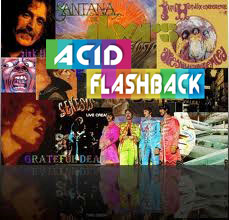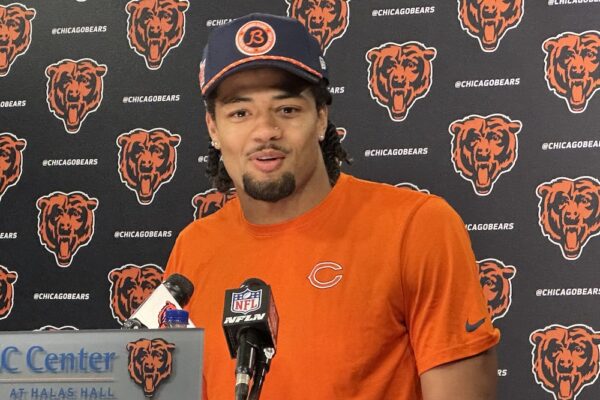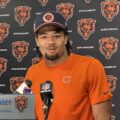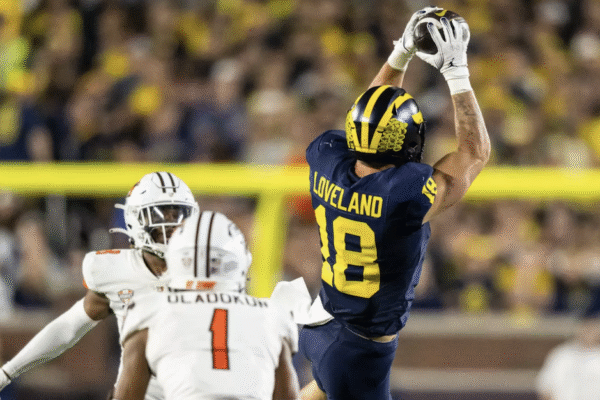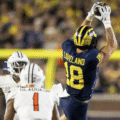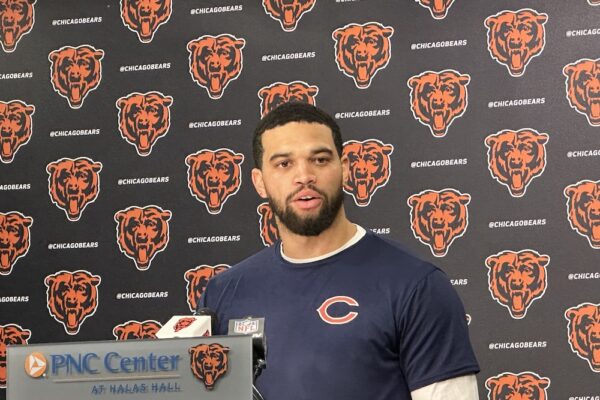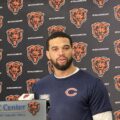by Steve Schreck
“If anything, we can learn from it and try to work on it in the future,” said Derrick Rose following a 96-94 loss to the Cleveland Cavaliers on April 27, 2010 that eliminated them from the playoffs.
2009-2010 made it two years in a row where the Bulls limped into the playoffs with a .500 record, and subsequently lost in the first round. It was clear that point guard Derrick Rose was headed to do great things, winning Rookie of the Year his first year and getting selected as an NBA All-Star in his second year. But where were the Chicago Bulls headed?
Listen to an audio compilation of interview clips.
Looking back, it seemed that Chicago was at a standstill with their progress, so in order to start competing at the next level, changes had to be made. The front office took the first step by firing coach Vinny Del Negro on May 4th. Del Negro, who had coached the Bulls for just two years, lacked the coaching experience that the young Chicago squad needed. In fact, he had no prior coaching experience at any level, other than playing in the NBA for thirteen years which proved insufficient.
Then, on June 5th, the Bulls organization agreed to a three-year deal with Tom Thiobodeau, a former assistant coach for the Boston Celtics.
Initially, there was some confusion by the hire, as the average fan had probably never heard of Thibodeau. However, around the league he was well-known. His name was synonymous with defense and experience. As the assistant coach for six different teams spanning eighteen years, and the assistant for the 2009 champion Celtics, Thibodeau was a good hire.
 As Tom was introduced June 23rd, it was apparent that this was the right move for both sides. Coach Thibodeau loved what he saw, “There’s a lot to sell here, obviously- the rich tradition of this organization, a great city, and a great young nucleus to build around.” The respect was mutual, “He’s got a great reputation around the league,” Bulls General Manager Gar Forman said. “Obviously, most of it is for his defensive knowledge and defensive credentials.” Forman also went on to say that he also has a creative offensive mind, but just wasn’t asked to use it in Boston. “He’s coached in a number of big games. He’s coached in number of playoffs games. Everywhere he’s been they’ve had success. He’s been a big part of coaching championship level basketball.” Forman added, “He’s got a great knowledge of the game.”
As Tom was introduced June 23rd, it was apparent that this was the right move for both sides. Coach Thibodeau loved what he saw, “There’s a lot to sell here, obviously- the rich tradition of this organization, a great city, and a great young nucleus to build around.” The respect was mutual, “He’s got a great reputation around the league,” Bulls General Manager Gar Forman said. “Obviously, most of it is for his defensive knowledge and defensive credentials.” Forman also went on to say that he also has a creative offensive mind, but just wasn’t asked to use it in Boston. “He’s coached in a number of big games. He’s coached in number of playoffs games. Everywhere he’s been they’ve had success. He’s been a big part of coaching championship level basketball.” Forman added, “He’s got a great knowledge of the game.”
It was evident that this selection process was taken seriously by Chicago’s front office, trying to find the best fit, and they were extremely thorough in doing so. Forman explains, “As part of our process we talked to a number of players that had played under Tom, and two of the examples that stood out were Yao Ming of Houston and Rajon Rondo at Boston, but the feedback that we got from the players that we talked to was that Tom was a terrific communicator and a terrific teacher of the game.” Most importantly, one of Forman’s last comments before he turned over the podium to Thibodeau, “He’s a winner.”
“There’s so much to offer. I can’t imagine why any free agent wouldn’t seriously consider this team,” coach Thibodeau said as he was introduced as the Bulls’ head coach.
This 2010 free agency period was so big, it had been seriously discussed as far as a year in advance, with every hypothetical one could imagine. The array of talent at almost every position was never seen, and for a lot of teams this marked a time to rebuild and compete the next year; something lacking with the annual draft based almost entirely on potential.
The one target that the Bulls went for the hardest, was still a possibility, but on July 8th LeBron James held his infamous “The Decision” on ESPN to announce his final verdict. The Bulls seemed to still be in the running until he stated, “In this fall, this is very tough, in this fall I’m going to take my talents to South Beach and join the Miami Heat.” Chicago lost out on all its major targets, it seemed. However tough the thought of James going to another team was, the Bulls still ended up getting a key addition.
The team needed a power forward and a shooter. They got both, signing Carlos Boozer and Kyle Korver formerly of the Utah Jazz. They even acquired Ronnie Brewer from the Jazz as well, who was known for his ability to lock down players on the defensive end. Thus, the Bulls added some key pieces that would surround their star point guard, but was it enough?
 Carlos Boozer thought so. He came in as the biggest pick up, and was happy with ending up in Chicago, “This is the perfect fit. I told these guys, if I was going to leave, this is the place I wanted to come first.” Despite the Bulls’ inability to acquire a major household name, Boozer had the confidence that this team would be the best in the East, “I think we’ll be at the top. We want to win championships.” It seemed clear that the Bulls had made a step in the right direction with the additions they made. Thoughts of a championship, or even sitting atop the Eastern Conference were the right things for Boozer to say for an organization on the rise, but how realistic were they?
Carlos Boozer thought so. He came in as the biggest pick up, and was happy with ending up in Chicago, “This is the perfect fit. I told these guys, if I was going to leave, this is the place I wanted to come first.” Despite the Bulls’ inability to acquire a major household name, Boozer had the confidence that this team would be the best in the East, “I think we’ll be at the top. We want to win championships.” It seemed clear that the Bulls had made a step in the right direction with the additions they made. Thoughts of a championship, or even sitting atop the Eastern Conference were the right things for Boozer to say for an organization on the rise, but how realistic were they?
Not too realistic said the media. Sports Illustrated writer, Brit Robson, constructed his first pre-season power rankings in October, seeding the Chicago Bulls at a pedestrian twelfth overall, with teams like Portland, Denver and Utah ahead of them. Even though ESPN’s Marc Stein had them winning the central division, on October 25th he had the Bulls sitting ninth in the power rankings. Despite being labeled as a good up-and-coming team, Chicago was not expected to compete with the big boys.
As the much anticipated 2010 season began, pedestrian was again the word that described the Bulls’ first month on the hard wood. Going 9-6 in the first fifteen games wasn’t impressive, and certainly wasn’t championship caliber. Boozer, who talked about championship level play in his introduction, was sidelined the first month of the season with a fractured hand.
He returned on Dec 1, 2010 only to witness a 29-point loss to the Orlando Magic. But after another loss to the Celtics two days later, something clicked for the Bulls as they rattled off seven straight victories. Chicago was ready to cement their spot as one of the East’s best teams.
Then news came on Dec 16th that Joakim Noah was set to have surgery on an injured right thumb that had been bothering him for quite some time, “It’s hurting and I’m playing and I’ve got to take anti-inflammatories every time I play. I can’t practice. I have to get it right,” said Noah according to ESPN. The Bulls couldn’t catch a break with Boozer’s injury, and now Noah, “It’s frustrating because I feel like we have a chance to be really, really good. And I’ve never been in a situation where were winning like this. But I know in the long run, this is what needs to be done.”
The injuries to Boozer and then Noah provided an opportunity for the bench to step up and make the team that much better during their absence from the starting lineup. Taj Gibson, Ronnie Brewer, C.J. Watson, Kyle Korver and Omer Asik formed what fans and players called the “bench mob.” Whether it was providing big minutes in place of the injured starters or simply coming off the bench to provide a spark, the bench mob was one of the key reasons behind the team’s success. Kyle Korver had some big games, specifically his twenty-two point effort against the Grizzlies in January, going 6-10 from three point land. Taj Gibson, at the beginning of the year with Boozer out, started the first fifteen games. He opened his first eight games averaging just over fourteen points per game, shooting close to sixty percent from the field. There weren’t a lot of games where the one bench player scored a great sum of points, but collectively, they were one of the best benches in the league bar none.
It was for this reason and well, Derrick Rose, that the Bulls went 22-8 from the time Noah announced he would have surgery until his return to action against the Raptors on February 23rd. When Noah returned, the Bulls continued to win going 11-2 in their next thirteen, including an eight game win streak. Over the final forty-three games Chicago’s record was 33-10, including 13 of the last 15 which secured home court throughout the playoffs.
Chicago went from a team that had promise at the beginning of the year, and possibly one of the East’s top four teams, to a squad with the best record in the NBA and all the confidence in the world. Still, they were not the favorite to win it all. Los Angeles and Miami were the top picks in each conference.
The Playoffs
The Bulls first round matchup was against the eighth seeded Indiana Pacers, a team that surprised people by making the playoffs. A team that played with great intensity that would end up making the first round more difficult than many thought. Led by star power forward Danny Granger Jr., rising point guard Darren Collison, and second year player Tyler Hansbrough, the Pacers gave the Bulls all they could handle.
Although eventually winning the series in five games, it was a battle. The most memorable part of series came in game one, as the Bulls entered the fourth quarter trailing by eight points. With less than four minutes the deficit had not changed, but the Bulls had Derrick Rose. The saying “stars shine the brightest in big games” rang true as Rose had a huge game, hitting unbelievable shots, finishing the game with 39 points and leading a frenzied comeback. The Bulls went on a 16-1 run in the final three and a half minutes to win game one 104-99 and take the series lead. Indiana’s Granger responded to the idea that they felt “safe” with the sizeable lead by saying, “with Derrick Rose on the other team, no.” He added, “It’s like a crazy stalker ex-girlfriend. Every time you tell her you don’t want to talk to her, she’ll show up at your door again.” The MVP followed his amazing performance in game one with 36 points in the second, and the Bulls headed to Indiana with a 2-0 series edge.
As things shifted to Indiana, Rose lost some of his spark. Despite that, the Bulls narrowly won game three, 88-84, as Rose struggled. Game four was the same story with Rose struggling again, but this time the Pacers prevailed 89-84. The series going into game five was close, as the point differential through the four games was a mere ten points. Game five was the only game where Chicago outmatched, outmuscled, and outshot Indiana, showing everyone watching that this was still the team that won 62 games in the regular season. They blew out the Pacers from the tip, and cruised to a seventeen point win 116-99, taking the series.
Round Two
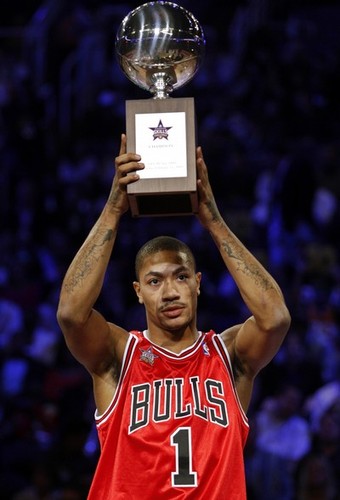 Next, the Bulls faced a team in the Atlanta Hawks that was a scary matchup for round two. The Hawks have been noted around the league as a team of underachievers. In spite of being one of the more talented squads in the league, the Hawks had yet to turn it on and show that they could play as a team. Their talent was undeniable comprised of Josh Smith, an athletic power forward who can score, rebound and block shots. Also, five-time All-Star, Joe Johnson, a shooting guard that can score in bunches. Plus, Al Horford, who was a teammate of Joakim Noah during a back-to-back National Championships at Florida. Horford is a similar player to Noah, athletic, who can rebound and score.
Next, the Bulls faced a team in the Atlanta Hawks that was a scary matchup for round two. The Hawks have been noted around the league as a team of underachievers. In spite of being one of the more talented squads in the league, the Hawks had yet to turn it on and show that they could play as a team. Their talent was undeniable comprised of Josh Smith, an athletic power forward who can score, rebound and block shots. Also, five-time All-Star, Joe Johnson, a shooting guard that can score in bunches. Plus, Al Horford, who was a teammate of Joakim Noah during a back-to-back National Championships at Florida. Horford is a similar player to Noah, athletic, who can rebound and score.
The series began with a wake-up call loss in game one, 103-95. Then, the Bulls turned the switch on. The series was highlighted by a career performance by Rose, scoring a remarkable 44 points, going 16-27 from the field in game three that had everyone talking. “He’s tough to cover anyway. But when his jump shot is falling, he’s the MVP,” said the player guarding him, Jeff Teague. The Bulls took four out of the next five to win the series in six, and advance to the Western Conference Finals for the first time since 1998.
Conference Finals
The Bulls would take on the Miami Heat in the Eastern Conference Final. While the Bulls were playing great basketball, the Heat were playing just as well. The dynamic trio of Dwayne Wade, LeBron James, and Chris Bosh finally started to click the way team President Pat Riley had envisioned. The Heat blazed past a less talented Philadelphia 76ers in the first round, winning in five games. Then, the Heat had to face a team in the Celtics that felt like an Eastern Conference Final type series. James had never beaten the Celtics in a seven game series in his seven years in Cleveland. However, the series turned out to be far less dramatic than many thought it would be, as the Heat overcame the Celtics in five games. The Heat celebrated as if they had won the championship, yet they had only won their second round series, and had a long way to go.
The series started off with a bang for the Bulls, as they seemingly dominated in every facet of game one. Shutting down Wade and James, winning the rebound battle, and dominating second chance points led to an almost perfect performance, winning by twenty-one points 103-82.
Considering they were first and second in the league defensively, the series accurately proved to be a blood bath. However, in the long run, Chicago was unable to take advantage of their defensive strength, as it was their offense, which proved costly for the Bulls during the remaining games.
As perfect a game Chicago played in game one, it was equally as bad in game two. Where in game one they couldn’t miss, game two they couldn’t buy a bucket. Chicago shot just thirty-six percent from the field, as Rose was an abysmal 7 for 23 from the field. In game one the Bulls shot eighty-five percent from the free throw line, but in game two they went just 16 for 26, a jaw-dropping sixty-one percent. It seemed like Chicago had all the momentum going into game two, but the Heat regained it going back to Miami.
In game three it was much of the same for the Bulls. The inability to hit shots cost them yet again. No matter how good their defense was playing, and it was playing exceptional, shots had to fall in order to win games and it wasn’t happening. Derrick Rose struggled again, going just 8 for 19 from the field in game three, a combined 15 for 42 over two games. But Rose needed help, someone to take the pressure of him, and no one stepped up to provide that. Because of this, Rose was forced to take bad shots again and again.
The trend continued in game four. Despite continued poor shooting from Rose, the Bulls had a chance to win at the buzzer. Rose shot up a contested two over LeBron James that hit nothing. He might have passed the ball, but with everyone else’s failures, he probably had no other option. The Heat then proceeded to go on a 16-8 run during overtime, winning 101-93.
Going into game five, questions about Rose’s struggles surfaced. Coach Thobdeau addressed the commotion, “He’s gotten some good shots that he hasn’t made. This guy has made big shots for us all year long. I have a lot of confidence in his ability. The important thing is making the right play. Trust your teammates. Just make the right play.”
The series then shifted back to Chicago for game five, and down 3-1, the Bulls were in a do-or-die situation. Chicago came out ready to play in game five and Rose looked much better. They seemingly controlled the game, and for long stretches it looked like Chicago was in a much better chance to win then in any of the previous three contests. Yet, the game isn’t over until the horn sounds, and with the ability of quick runs in the NBA to come out of nowhere, that’s exactly what happened. With just three minutes to go, the Bulls were up by twelve 77-65. Then, Wade and James took over. Wade started off by hitting a two, getting fouled and making the free throw. Next time down the court, James hit a three to cut the lead to just five. After a Rose layup, Wade converted a four-point play. Now the lead was just three 79-76, and next time down the court for Miami, James evened the game at the one-minute mark with another three. Then with just 29.5 seconds left James hit a dagger two, putting Miami up by two, and eventually taking the series.
Summary
There was much discussion as to why the Bulls lost the way they did. How did they blow that lead in game five? It came down to a few things: first, the Heat had Wade and James. They were spectacular in the fourth quarter. When stars are hot like they were, it’s almost impossible to stop them.
Second, going back to coach Thobdeau’s comment on Rose before game five. “Trust your teammates.” It looked like he didn’t trust his teammates; and with good reason. Sure, there were a few games where players stepped up, but nothing consistent, nothing for Rose to say, “Hey I can count on this guy making a big shot for me because I’m struggling right now.” Supposed sharp-shooter Kyle Korver went an unimpressive 7 for 22 from the field in the most important series, against Miami in the Eastern Conference Finals. Luol Deng shot just forty-two percent from the field against the Heat, and was off and on for most of the playoffs.
However disappointing the end to the season was, it’s important to keep things in perspective. General Manager Gar Forman did just this a few weeks after the game five loss, “Obviously when a season ends, it always seems sudden because you’re never expecting to lose. But then when you have time to look back and reflect, this team accomplished a lot of good things. From the sixty-two wins, most wins in the league, to getting to the Eastern Conference Finals, and winning a couple playoff series. The experience that these players got going through a long playoff run I think is really going to serve us well going down the road.”
The 2011 draft for the Chicago Bulls was respectable, but anyone hoping to find a franchise two-guard in one of the weakest draft’s in recent memory was kidding themselves. Sure there were some good shooting guards in the draft, but by the time the Bulls picked at twenty-eight, most of those players were off the board. They eventually traded up to get the twenty-third pick, choosing Nikola Mirotic, a skilled big man from Montenegro. With the 30th pick, Chicago grabbed a power forward from Marquette, Jimmy Butler. Butler, at 6’ 8’’, is an athletic versatile defender who can also score off the bounce.
Since the Bulls didn’t address the two-guard position in the draft, the next step is trading for one who can create and score. Free agency is also a possibility. Names like Jason Richardson, J.R. Smith, Tracy McGrady, Shannon Brown among others are being talked about as possible free agents. Obviously through trade you can pick up a bigger name, but have to give up some talent in order for that to happen. The only question is, are the Bulls willing to give up some young talent?
Expectations are hard to grasp, because they change constantly, and no one is ever satisfied. In reality, the Bulls took some huge steps from losing to the Cavs in the 2010 playoffs, and where they finished the following year. This could be a very special ride for a lot of years to come. It remains to be seen what kind of impact the collective bargaining agreement and current lockout will have on the promising future of the Chicago Bulls.
